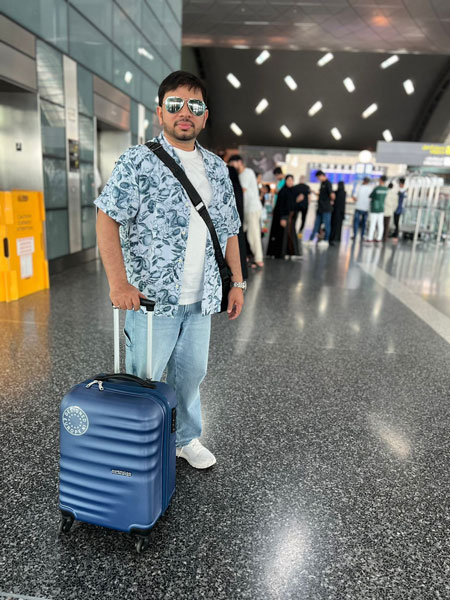September 18, 2025
The night before Susee flew home, we sat around a table in Doha, sharing dinner. It was one of those easy evenings when conversation flows and the hours slip away unnoticed. He was excited — after months away in Qatar, he was finally going back to his wife chintu’s village in Indonesia. Inside his hand baggage, tucked carefully into the overhead bin for safekeeping, was the gift he had saved for: a brand-new iPhone 16. He wanted to surprise her.
June 7th At 2:00 a.m., his flight lifted off from Doha, bound for Jakarta. Nine hours in the air, the cabin lights dimmed, most passengers drifting into sleep. Susee did too. When the plane landed, he collected his bag and went through the usual motions of immigration and customs. It wasn’t until he reached the counter to register the IMEI number of the new phone that he opened his bag — and felt his stomach drop. The phone was gone. So were his bank cards.


What followed was not a homecoming but a test of endurance. He was stranded in Jakarta, waiting twelve long hours in the terminal, filing complaints that led nowhere, calling numbers that rang without answers. He missed his connecting flight to Medan. The joy of return had been replaced with exhaustion, hunger, and a gnawing disbelief: even the bag above his head, the one he thought safest, had betrayed him.
In desperation, Susee raised a complaint with Qatar Airways’ customer service. What made matters even more alarming was what happened next: his received message that someone in Jakarta had tried to swipe his card, likely using a handheld machine. He acted quickly, blocking the card before further damage could be done. The precision of the attempt was chilling — this was no random theft but a professional operation. Upon return from vacation, he also filed a report with the Qatar police, since the suspected thief had boarded the flight from Doha itself. Months later, his case remains unresolved.
The Business of Theft
This was not chance. In recent years, a troubling pattern has emerged. Thieves board flights with the intention to steal, knowing that passengers often place their most valuable items — phones, wallets, gold — in cabin bags. They move under the cover of darkness or distraction, unzipping a bag in seconds, sliding a box or pouch into their own.
Passengers still think of theft as something that happens to checked luggage. Susee’s story proves otherwise. The overhead bin is not a vault. It is a blind spot. And for those who make theft a business, it is an opportunity.
Closer to Home
For those of us from coastal Karnataka, another reminder came recently — this time on the ground. At Mangaluru International Airport, a woman discovered that 56 grams of gold ornaments, worth nearly Rs 4.5 lac, had vanished from her checked-in luggage. When police investigated, they arrested four baggage handlers. The men confessed, even admitting to an earlier theft of Rs 2 lac in cash from another passenger’s bag.
The betrayal cut deeper because it was committed by the very people trusted to safeguard our belongings. If baggage handlers at a secure airport can turn to theft, and if strangers on airplanes can unzip bags mid-flight, what safety do our possessions really have?
More Than Bags
For NRIs in the Gulf, each trip home carries more than luggage. It carries months — sometimes years — of sacrifice. Shared rooms. Skipped meals. Long shifts under harsh heat. And with that sacrifice come dreams, carefully packed into suitcases: a necklace for a daughter’s wedding, currency for a parent’s medical bills, a phone for a wife waiting eagerly at the door.
When theft happens, the loss is not measured in rupees or riyals. It is measured in broken promises. The gift that never reaches the hands it was meant for. The excitement that dissolves into tears at an airport counter.
A Wake-Up Call
Susee’s ordeal and the Mangaluru theft share the same message: no bag is safe simply because it is near you or locked away.
What NRIs need to know — and urgently — is this:
• Do not place gold, cash, or electronics in checked baggage.
• Even in cabin bags, keep valuables close to your body, not above your head while you sleep.
• Use tamper-proof locks and discreet pouches.
• Stay alert in-flight, especially on long overnight journeys.
• Report every theft, even if the system feels slow. Silence only emboldens thieves.
The Suitcase of Dreams
At airports, the bags rolling down conveyor belts don’t just carry clothes or trinkets. For millions of migrants flying home from the Middle East, each suitcase is a vessel of sacrifice — wages exchanged for gold bangles, a new phone, toys for children waiting eagerly by the door. It is not luggage. It is love, wrapped in plastic, sealed with faith.
I still remember my father’s return from Saudi Arabia when I was a boy. He came through the crowded terminal of Bombay airport, balancing a bag heavier with emotions than with goods. My mother’s eyes searched his hands not for passports or papers, but for the carefully chosen gifts tucked inside. To us, the bag was a treasure chest.
Decades later, the ritual remains unchanged. But the trust in that journey — from check-in counter to baggage belt — has begun to fray.
When I picture Susee that night in Jakarta, sitting alone with his bag and his frustration, I don’t see a missing phone. I see the smile that was supposed to bloom on his wife’s face, stolen before it could exist.
For us NRIs, a suitcase is never just a suitcase. It is a suitcase of dreams. And until airlines and airports confront the rising thefts that shadow our journeys, we must protect those dreams ourselves — awake, alert, and unwilling to let them slip into the shadows above our heads.